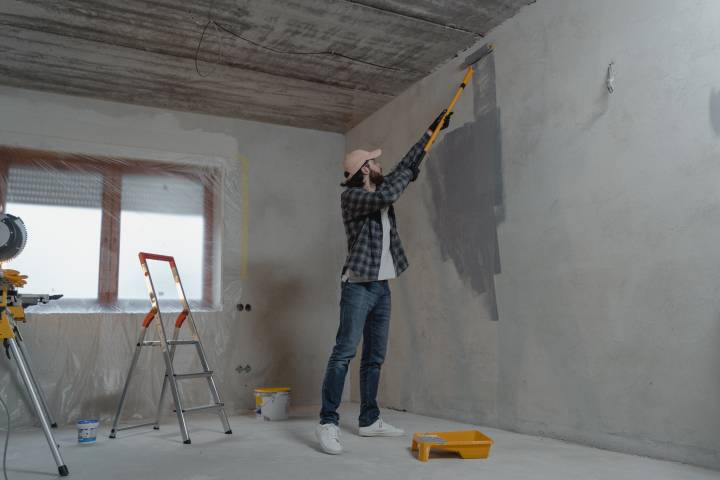
DIY home renovation projects can give homeowners a sense of accomplishment and satisfaction. Taking on these challenges without professional help often presents many cost-saving opportunities. However, it is essential to remember that some tasks are best left up to the professionals. Before taking on any project, however, planning carefully to ensure success is essential.
First and foremost, homeowners should assess their skills or those available within their circle of family or friends who may be able to assist with complicated projects. Doing so eliminates the need for costly labor costs associated with having a licensed contractor complete specific jobs. Knowing what type of tools will be required for a job allows homeowners to purchase the necessary supplies to save time and money.
If a project involves painting, preparing surfaces thoroughly before starting is essential, which includes removing dirt, dust, and debris with a vacuum cleaner or cloth. Priming walls before painting them will help produce a more even finish and provide better coverage for darker colors. Investing in high-quality paintbrushes, rollers, and other supplies designed specifically for the job is also wise.
Replacing flooring can be another big undertaking for DIY home renovation projects. Depending on the type of flooring being replaced, this task should be done carefully and correctly, as mistakes could cost homeowners both time and money if improperly installed materials need to be replaced. Use specially designed hardware from Rous Hardware and the right tools for the job, as well as measuring and cutting correctly to ensure a proper fit.
Kitchen and bathroom remodeling often requires electrical work and plumbing tasks when cabinetry or fixtures need to be replaced. For homeowners with limited experience in either of these areas, it is essential to have a licensed electrician inspect wiring before starting any project involving electricity for a safe outcome. If outdated wiring needs to be brought up to code, having this done professionally will help prevent fires from occurring due to incorrectly installed wires.
When to use a contractor when renovating your home?
Knowing when to use a contractor is essential when undertaking a DIY renovation project. A licensed professional may be necessary to meet local codes or regulations and ensure safety and quality artistry. Contractors can also bring the expertise and experience that the average homeowner may need to gain.
Some projects that should typically require the assistance of a professional include electrical and plumbing work, structural modifications, and any jobs involving hazardous materials such as asbestos or lead paint. Exterior tasks like window or roof replacements should also be handled by a qualified individual familiar with applicable building codes in the area.
Using a contractor for home remodeling or renovation often saves homeowners time and money in the long run. It is especially true for complicated jobs that require specialized tools or knowledge. Working with a licensed professional will provide peace of mind knowing that all work has been completed correctly and safely. Furthermore, using a contractor for larger projects can help spread out payments over an extended period.
In addition to saving time and money, hiring an experienced contractor gives homeowners access to knowledge and resources outside their scope of understanding or available tools. Doing so also allows them to focus on other aspects of the project while ensuring their vision is accurately represented in the final results.
DIY home renovation projects can be advantageous; however, knowing when to hire a contractor will help protect both time and financial investments while helping ensure that desired outcomes are achieved safely and efficiently.
What are the drawbacks?
Despite the many benefits of DIY home renovation projects, some drawbacks should be considered before beginning any job. Some tasks may require tools and supplies beyond what is available to most homeowners and must be rented or purchased to complete them. In addition, a learning curve can be associated with properly using new tools, leading to wasted time and materials and potential dangers if done incorrectly.
Another potential risk is personal safety. Working with big power tools without the proper protective gear can expose homeowners to serious injury due to flying debris or chemical fumes. Additionally, overambitious jobs can quickly become too much for one person to handle if they lack the experience necessary for successful completion. Finally, complex remodeling or renovation projects may require permits or inspections, which can be difficult for homeowners to obtain without the assistance of a professional.
Final words
Many DIY home renovation options are available to homeowners, from painting walls and replacing flooring to installing new fixtures. Assessing skill levels, acquiring the right tools, and following manufacturer instructions will help ensure success. However, when electrical or plumbing work is required, it is essential to have a licensed contractor handle these more complicated tasks for a safe outcome. With careful planning and proper implementation, homeowners can confidently tackle their projects, knowing they can save time and money while creating lasting results that add value to their homes.
We hope you found this blog post on DIY renovation: Tackling home improvement projects with confidence, useful. Be sure to check out our post on Home Improvement Projects to Make a Home More Valuable for more great tips!
Have Experience in the Moving Industry? Want an Additional Income Stream? Work With All Around Moving!
Partner with us and join the Work With Us program, and we’ll help you make money by establishing your own moving consultant business. Read the terms by Clicking here to learn more.





